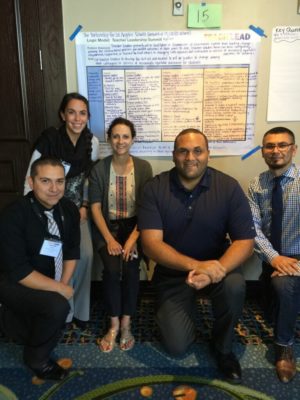CSTP Updates
- March 21: Culturally Responsive Education in the Classroom: An Equity Framework for Pedagogy written by Dr. Adeyemi Stembridge
- March 27: Zooming In & Out on Inclusionary Practices Dr. Katie Novak and Shelley Moore
Legislative Update for February 10, 2023
Hello and happy Friday! This is the last week before lawmakers face their first legislative cut-off of the 2023 session. Next Friday, February 17, is the last day for legislators to pass bills out of committee in their respective house of origin, except for fiscal committees. Bills that do not make it out of committee are considered “dead” and will no longer be considered for any action during the remainder of session. The fiscal committee cut-off date is the following Friday, February 24.
Although there were several bills that drew significant attention this week, SB 5505 and HB 1479, are worth highlighting. SB 5505, the highly anticipated, “balanced calendar bill,” aims to combat learning loss by adding 5 days to the traditional 180-day school year, as well as adjust the school calendar to get longer breaks spread throughout the year and prevent summer learning loss. According to OSPI, “A foundation of the balanced calendar is continuous access to food, instruction, care, and education resources, which research shows is especially important in preventing summer learning loss for students who may not have the benefits of travel, camps, and trips to the library.”
HB 1479 would prohibit students from being subjected to isolation or restraint and its companion bill in the senate, SB 5559, also received a public hearing this week. The Seattle Times reported that in Washington, students with disabilities were exposed to restraint and isolation at higher rates as well as elementary school students who were disproportionately restrained and isolated at an age when they are still learning to regulate behaviors and emotions. HB 1479 is scheduled for executive session next Thursday, February 16 at 8am.
Education Hearings for Next Week on TVW.org
House Education Committee
- Monday, February 13 at 1:30pm
- Tuesday, February 14 at 4pm
- Thursday, February 16 at 8am
Senate Early Learning & K12 Education
- Monday, February 13 at 1:30pm
- Wednesday, February 15 at 1:30pm
New Bills
HB 1749: which promotes instruction in public schools about the historical and cultural contributions of Filipino Americans.
SB 5692: which would increase the maximum per pupil limit for enrichment levy authority.
SB 5710: which would provide access to behavioral health services to youth in rural and underserved areas.
Bills We’re Following:
HB 1003: which would lower dual credit program costs for eligible students with financial need by creating a subsidy program, reducing per college credit fees for college in the high school students, and revising eligibility for the Running Start program tuition fee waiver, and would also make the Running Start program permanent to pilot institutions. The bill has been passed out of committee.
HB 1013: which would require OSPI and Washington ESDs to jointly establish a regional apprenticeship pilot program with one site each in Eastern and Western Washington. The bill is currently in the House Appropriations Committee.
HB 1015: which revises minimum employment requirements for paraeducators. The bill is in the Senate Early Learning & K-12 Committee.
HB 1071: which would require OSPI to allocate state funding to school districts for one school resource officer (SRO) on each public school campus (hearing time 0:59 and 57:33). Testifying in support: representatives from the Chehalis SD, WACOPS and the WASPC. Testifying in opposition: representatives from the ACLU of WA, HEA, and a concerned citizen.
HB 1109: which would provide additional special education funding to school districts in order to increase initial evaluations during summers. The bill is in the House Appropriations Committee.
HB 1113: which would require the Professional Educator Standards Board (PESB) to adopt rules for reviewing and vacating reprimands issued to certificated professional educators. The bill is in the Senate Early Learning & K-12 Committee.
HB 1146: which would require schools to notify high school students and their families about available dual credit programs and any available financial assistance. The bill is currently in the House Rules Committee.
HB 1207: which aims to prevent and respond to harassment, intimidation, bullying, and discrimination in schools through updated policies and procedures. The bill is currently in the House Rules Committee.
HB 1228: which establishes grant programs for establishing or expanding dual language education programs and tribal language education programs and would establish multilingual skill bonuses for certificated instructional staff and paraeducators. The bill is in the House Appropriations Committee.
HB 1238: which requires public schools, beginning with the 2023-24 school year, to provide breakfast and lunch each school day to any requesting students and at no charge to the students. The bill has passed out of committee.
HB 1239: which would establish a simple and uniform system for complaints related to, and instituting a code of educator ethics for, conduct within or involving public elementary and secondary schools. The bill is in the House Appropriations Committee.
HB 1273: which would establish new and revised requirements for High School and Beyond Plans (HSBPs) that are a prerequisite for graduating from a public high school. The bill has passed out of committee.
HB 1277: which would establish rules to improve the consistency and quality of the implementation of the fundamental courses of study for paraeducators. The bill is in the House Rules Committee.
HB 1305: which would make changes to the requirements to initial student evaluations for special education and to the development and implementation of individualized education programs (IEPs) in order to improve access to a free appropriate public education for students with disabilities. The bill has passed out of committee.
HB 1308: which establishes a graduation pathway option that enables students to meet pathway requirements by completing a performance-based learning experience (hearing time: 41:59). Testifying in support: representatives from the SBE, BIAW, Central Valley SD, WSPTA, Rural Ed Center and Vancouver PS. Testifying in opposition: representatives from the WA Round Table. Testifying as “other”: representatives from OSPI, Lakewood Cares, Lake Washington SD and WSSDA. The bill is scheduled for executive session February 16 at 8am.
HB 1316: which would lower dual enrollment program costs for eligible students from $65 to $42.50 per credit by creating a subsidy program, incentivizing reduction of per college credit fees charged to college in the high school students, and revising eligibility for the Running Start (RS) program tuition fee waiver. The bill has passed out of committee.
HB 1332: which would require all school districts to incorporate a tribal sovereignty curriculum into their social studies curricula by September 1, 2023, as well as require districts to consult with the nearest federally recognized Indian tribe(s) about incorporating materials about their history, culture, and government into their social studies curricula by September 1, 2025. The bill has passed out of committee.
HB 1377: which would require the posting of approved courses and providers of continuing education. The bill is scheduled for executive session February 16 at 8am.
HB 1411: which would direct OSPI to distribute funding to school districts and institutional education providers to partner with community-based organizations that support students to offer cross-sector trainings on topics such as social-emotional learning, mental and behavioral health management, and teaching students to be peer mediators. The bill has passed out of committee.
HB 1478: which establishes a statement of student rights for public schools and requires public schools to develop student-focused educational and promotional materials that incorporate the statement and to include the materials into required civics instruction. The bill has passed out of committee.
HB 1479: which would prohibit students from being subjected to isolation, mechanical restraint, or chemical restraint by school staff, except for school resource officers under some circumstances, and specifies that existing isolation rooms must remain unlocked, and no new isolation rooms may be created, and, by January 1, 2024, isolation rooms must be removed or repurposed (hearing time: 59:44). Testifying in support: representatives from Disability Rights WA, several concerned citizens, PAVE The Arc of WA and OSPI. Testifying in opposition: a concerned citizen. Testifying as “other”: representatives from the Central Valley SD, WEA, WSPTA and PSE. The bill is scheduled for executive session February 16 at 8am.
HB 1504: which requires public schools, beginning with the 2024-25 school year, to provide daily recess for all students in kindergarten through grade 5, and grade 6 if the students attend an elementary school (hearing time: 1:00:42 and 1:31:25). Testifying in support: a concerned citizen, Issaquah HS, WEA, Renton SD, KC Play Equity Coalition and Ellensburg HS. Testifying as “other”: representatives from OSPI, WSSDA and WSPTA. The bill is scheduled for executive session February 16 at 8am.
HB 1550: which would establish the transition to kindergarten program to provide no-charge assistance to eligible children in need of additional preparation to be successful kindergarten students in the following school year (hearing time: 42:34). Testifying in support: representatives from the Yakima SD, a concerned citizen, the Spokane PS, Quincy SD and Concrete SD. Testifying in opposition: representatives from the WEA, Sammamish Montessori School, the Rural Ed Center, the Stevenson-Carson SD and North Mason SD. Testifying as “other”: representatives from the Walla Walla SD, West Valley SD and the AESD. The bill is scheduled for executive session February 16 at 8am.
HB 1565: which requires the development of an online platform for the recruitment and hiring of public school employees and establishes a teacher residency program (hearing time: 3:51). Testifying in support: representatives from PESB, WEA, Foundation for Tacoma Students, OSPI, WSPTA, WACTE, SWEA, Rural Ed Center and AWSP. The bill is scheduled for executive session February 16 at 8am.
HB 1609: which requires school districts to provide resources for the operation of school library information and technology programs and to ensure that each student has access to a library technology program that meets specified requirements (hearing time: 1:46:46). Testifying in support: representatives from the WLA, Capitol HS, Camas HS, Bellevue HS, Shoreline SD, OSPI and WSSDA. Testifying in opposition: representatives from the Kettle Falls SD. The bill is scheduled for executive session February 16 at 8am.
HB 1622: which aims to support the needs of students experiencing homelessness by aligning program goals, establishing common reporting requirements, and establishing examples of permitted expenditures for the OSPI program (hearing time: 1:08:23 and 1:24:00). Testifying in support: representatives from Building Changes, Council for the Homeless and the Lynnwood City Council. The bill is scheduled for executive session February 16 at 8am.
HB 1658: which would authorize high school students aged 16 and above to earn up to two elective credits through paid work experience if approval and alignment with the student’s High School and Beyond Plan are met (hearing time: 1:30:44). Testifying in support: representatives from the WFIA and WSPTA. Testifying as “other”: representatives from WSSDA, OSPI and SBE. The bill is scheduled for executive session February 16 at 8am.
HB 1701: which concerns basic education services to youth who are served through institutional education programs (hearing time: 35:37). Testifying in support: representatives from OSPI. Testifying as “other”: representatives from DCYF and WEA. The bill is scheduled for executive session February 16 at 8am.
HB 1710: which would use COVID-19 relief funding on high quality tutoring and rigorous extended learning programs. The bill is in the House Appropriations Committee.
SB 5019: which removes “classified staff providing student and staff safety” from the definition of physical, social, and emotional support staff and the specific funding considerations for that group. The bill is in the Senate Rules Committee.
SB 5020: which would lower the minimum age for compulsory school attendance from eight to six years old, and amend truancy provisions to align with this change, as well as require parents who homeschool to file an annual declaration of intent beginning at age 6. The bill is in the Senate Ways & Means Committee.
SB 5024: which would require school districts to post certain assessment results on their websites, as well as provide parents and legal guardians with certain rights regarding access to specified information and communication based on their preferences (hearing time: 27:26). Testifying as “other”: representatives from WSSDA.
SSB 5048: which would eliminate college in the high school fees. The bill is in the Senate Ways & Means Committee.
SSB 5054: which would modify instructional hours to include time students spend in educational activities under the supervision of non-certificated staff while teachers participate in professional learning communities (PLCs) as well as encourage school districts to adopt a school calendar that includes at least four hours per week for teachers to engage in PLCs during the school day. The bill is in the Senate Rules Committee.
SSB 5072: which would establish new requirements for identifying students who may be eligible for highly capable services, including conducting universal screenings once in or before second grade, and again before sixth grade. The bill is in the Senate Rules Committee.
SSB 5085: which would remove statutory limitations on the scope of collective bargaining in regards to supervisors, or principals and assistant principals, and would require specific evaluation criteria when transferring a principal/assistant principal to a subordinate certificated position. This bill would prohibit school district employment applications from including a question asking whether the applicant has ever been on a plan of improvement, or under an investigation. The bill is in the Senate Rules Committee.
SSB 5102: which requires school districts and school boards to provide every student with access to school library information and technology programs.The bill is in the Senate Ways & Means Committee and scheduled for public hearing on February 14 at 4pm.
SSB 5127: which would clarify school districts’ ability to redact personal information related to a student. The bill is in the Senate Rules Committee.
SSB 5174: which would modify the student transportation allocation formula and expand the definition of “to and from school” to include the transportation of students participating in career connected and work based learning opportunities. The bill is in the Senate Ways & Means Committee.
SB 5175: which would allow employment contracts between a school board and principal to be up to three years in length, as opposed to limited to a term of one year. The bill is in the Senate Rules Committee.
SB 5180: which aims to support the retention of teachers by removing barriers to licensure and creating a streamlined pathway to licensure mobility. The bill is in the Senate Ways & Means Committee.
SSB 5237: which would direct OSPI to establish procedures to investigate and address complaints alleging noncompliance with state laws regarding civil rights, certain curriculum requirements and student discipline. The bill is in the Senate Ways & Means Committee.
SSB 5243: which revises high school and beyond plan (HSBP) requirements, and would require OSPI to facilitate the transition and adoption of a common online platform for HSBPs. The bill is in the Senate Ways & Means Committee.
SB 5248: which would reappropriate COVID-19 relief funding for grants to be used on high quality tutoring and rigorous extended learning programs. The bill is in the Senate Ways & Means Committee.
SSB 5257: which would ensure that public schools provide daily recess for all elementary students with a minimum of 45 minutes when the school day is longer than five hours and a minimum of 30 minutes when the school day is shorter, as well as prohibit schools from withholding recess as a punitive action. The bill is in the Senate Rules Committee.
SB 5264: which would require paraeducators to receive a passing grade on a Paraeducator Board-approved assessment, rather than the Education Testing Service paraeducator assessment (hearing time: 1:00). Testifying in support: representatives from the WEA, PESB, the Rural Ed Center, AWSP and PSE.
SSB 5311: which would increase the special education excess cost multipliers for pre-K and K12 students over a four-year period and increase the special education enrollment funding cap from 13.5 percent to 14.5 percent. The bill is in the Senate Ways & Means Committee.
SSB 5315: which would require OSPI to establish standards for approval, monitoring, and investigating school district contracts with nonpublic agencies (NPAs) operating special education programs for students with disabilities, and requires that restraint and isolation procedures and notification requirements apply to NPAS. The bill is in the Senate Ways & Means Committee.
SB 5355: which requires school districts to provide instruction on sex trafficking prevention and identification at least once between grades 7 and 12 beginning in the 2024-25 school year. The bill is in the Senate Ways & Means Committee and is scheduled for executive session on February 13 at 4pm.
SSB 5339: which would add free school breakfast and lunch to the state’s program of basic education beginning in the 2023-24 school year. The bill is in the Senate Ways & Means Committee.
SB 5408: which would establish the Ninth Grade Success Grant Program, which funds the creation of ninth grade success teams that can identify and support incoming high school students who are at risk of not graduating. The bill is in the Senate Ways & Means Committee.
SB 5441: which would require larger school districts to designate inclusive curricula coordinators and smaller school districts to work with their educational service districts (ESDs) to promote the development and adoption of curricula that is diverse, equitable, and inclusive. The bill is in the Senate Ways & Means Committee.
SB 5442: which would provide a per-pupil enrichment grant to charter schools in an amount equivalent to the state local effort assistance threshold: $1,550 per pupil. The bill would also authorize charter schools to apply for state grants on the same basis as school districts (hearing time: 29:00). Testifying in support: representatives from Rainier Prep, BESR, a concerned citizen, Summit Olympus Charter School and WI-HS.
SB 5462: which would direct OSPI to review and update relevant state learning standards at all grade levels to include the histories, contributions, and perspectives of LGBTQ people, and historically marginalized and underrepresented groups, by December 1, 2024. The bill is in the Senate Rules Committee.
SB 5505: which aims to address learning loss by expanding the mandatory number of school days for public K-12 schools from 180 days to 185 (hearing time: 45:53). Testifying in support: representatives from OSPI and WASA. Testifying in opposition: representatives from the Conservative Ladies of WA. Testifying as “other”: representatives from the WEA and WSSDA.
SB 5527: which would add additional courses to the list of courses approved as a graduation pathway option (hearing time: 49:25). Testifying in support: representatives from the SBE. Testifying as “other”: representatives from OSPI.
SB 5559: which would prohibit the isolation, mechanical restraint, or chemical restraint of students by school staff, including the phasing out of isolation rooms (hearing time: 55:32). Testifying in support: representatives from OSPI, ACLU, AASR, WSPTA, SSEPTSA, Arc of King County, CPI, several concerned citizens, Disability Rights WA, Seattle School Board, WFIS, PAVE and the SCPTSA. Testifying as “other”: representatives from the West Valley SD, PSE and the WEA. Crosscut has more on this: WA Bills Propose Initiatives to Bring Special Ed Students Back Home
SB 5626: which requires OSPI to establish a grant program for expanding the capability of school districts to integrate media literacy and digital citizenship into public school instruction (hearing time: 11:26). Testifying in support: representatives from OSPI, WLA, WSPTA, several concerned citizens, Capitol HS, Kent SD, CCI, AME and WSCSS. The bill is scheduled for executive session February 13 at 130pm.
SB 5647: which requires safe school plans to include how substitute teachers and other temporary employees receive necessary information, including school safety policies and procedures and the three basic functional drill responses (hearing time: 2:30). The bill is scheduled for executive session February 13 at 130pm.
SB 5650: which concerns salary inflationary increases for K-12 employees. The bill is in the Senate Ways & Means Committee and is scheduled for public hearing on February 14 at 4pm.
SB 5671: which would make experience factor adjustments for certificated instructional staff. The bill is scheduled for public hearing February 13 at 130pm.
Odds and Ends:
“When do we stop pushing for people to walk or talk in normative ways and instead acknowledge and embrace difference?” This week from MindShift: How Teachers can Disrupt Linear Development Models and Support Students with Disabilities.
“These students didn’t move out of state, and they didn’t sign up for private school or home school, according to publicly available data. In short, they’re missing.” From the Seattle Times’ Education Lab, Thousands of Kids are Missing from School. Where Did They Go?
Meet CSTP’s Legislative Update Coordinator Samantha Miller

Samantha Miller returns as CSTP’s Legislative Updates Coordinator for the 2023 legislative session. She writes weekly emails during the legislative session focusing on bills that impact Washington educators. Samantha has degrees in both Political Science and History, as well as a Master in Teaching. Samantha has worked in Elementary Education for 6 years, most recently as a 3rd Grade general education teacher. The majority of her time is spent chasing around her two children who keep her very busy. Samantha enjoys running, working in her yard, listening to political podcasts, and spending time with her family.





